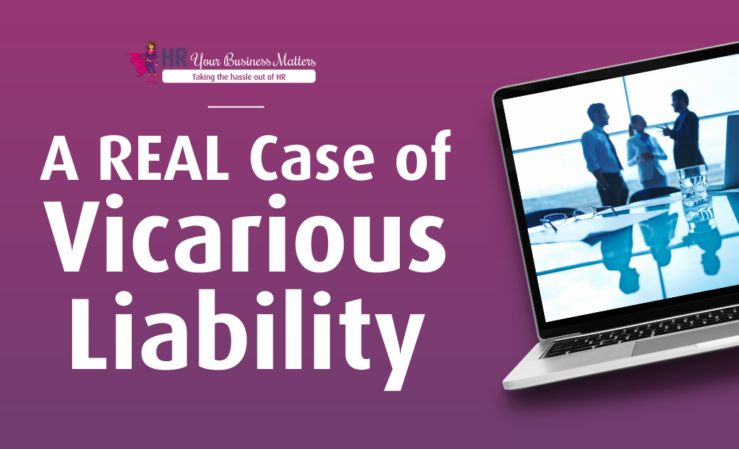
What is vicarious liability?
Vicarious liability refers to the legal obligation that holds an employer responsible for the wrongful actions or omissions of its employees. In other words, if an employee of your company causes harm to another person or entity while acting within the scope of their employment, you can be held liable for their actions, even if you did not personally engage in any wrongful conduct or have any insight into it happening.
Vicarious liability is based on the idea that you as an employer have a duty to ensure your employees behave responsibly and in accordance with the law while performing their duties. It is generally considered that you have more resources and control over your employees’ actions, and therefore can be held responsible for any harm caused by their actions.
Examples of situations where vicarious liability might apply in employment include cases of employee negligence, such as a driver causing a car accident while on the job, or cases of employee misconduct, such as harassment or discrimination.
However, it’s important to note that in order for vicarious liability to apply, the employee must have been acting within the scope of their employment at the time the harm occurred. So lets cover of an actual example ……
A real case of Vicarious Liability
A few years ago, a manager within a recruitment agency and an employee had a physical altercation; the employee was left with brain damage due to the altercation which resulted in the employee banging the side of his head as he fell over. Initially, who do you think is to blame?
The recruitment agency arranged a Christmas party for their employees, they also arranged taxis to a hotel where staff could stay and enjoy some more drinks and socialise further before retiring to their rooms. The party, taxi and most of the drinks were paid for by the company, as a way of thanking staff members for all their hard work over the year.
At the hotel after the party, there was a heated discussion between the manager and the employee, fueled by the alcohol consumed by both throughout the night. The manager became angry and took the opportunity to give the employees a long lecture in front of others, which was challenged by one employee. This challenge resulted in the manager lashing out and punching the employee.
The employee sustained a fractured skull, subdural and subarachnoid hemorrhages, and a left frontal lobe contusion.
At the court of appeal, the recruitment agency was found liable. The reason that the judge felt the company was vicariously liable is because the manager was a senior position within the company. He had the power and authority entrusted to him. The act of misconduct was triggered by the challenge to his authority and the risk of wrongful conduct was enhanced by the provision of the alcohol authorised by the company.
Now, whilst you may be thinking that this altercation happened after the official Christmas party and therefore couldn’t possibly be the responsibility of the company. The consideration of the after party was that alcohol was still being purchased by the company at the hotel, along with the hotel and taxis all being paid for by the company.
So, what can you do to lessen the risk of vicarious liability?
Team parties, team building events and drinks after work are a really nice way of thanking your employees for their hard work and showing them that they are appreciated. However, you need to think carefully about what you do, how you do it, if alcohol will be involved and if the business is paying for the alcohol or not.
Here’s 5 top tips to help keep your team members safe and avoid vicarious liability claims:
-
Implement clear policies and procedures
You should have clear policies and procedures in place that outline the expectations and standards for employee behaviour and provide guidance on how to handle different situations. This can help ensure that employees understand what is expected of them and can reduce the risk of wrongful behavior.
-
Provide regular training:
You should provide regular training to employees on topics such as discrimination, harassment, and safety. This can help ensure that employees are aware of their responsibilities and can help prevent harmful behavior.
-
Go alcohol free
Ok so this may dampen the party spirit for some, but going alcohol free can be a way of avoiding alcohol fueled arguments. Alternatively, set clear limits on alcohol limits and don’t open up a bar tab. If there are individuals who have had previous incidents of inappropriate behaviour during socials, consider having a private conversation with them.
-
Monitor employee behaviour
Now this tip isn’t about being the fun police, but it is however assigning individuals to ‘keep an eye’ on the goings on and be able to intervene if needed. This can help identify any issues early on and take corrective action to prevent harm to others.
Are you unsure about vicarious liability?
If you are unsure about vicarious liability and how to protect your business from it, then please contact us directly on 01733 739660. We will be happy to listen to your concerns, answer any questions and recommend the best plan of action going forward.

